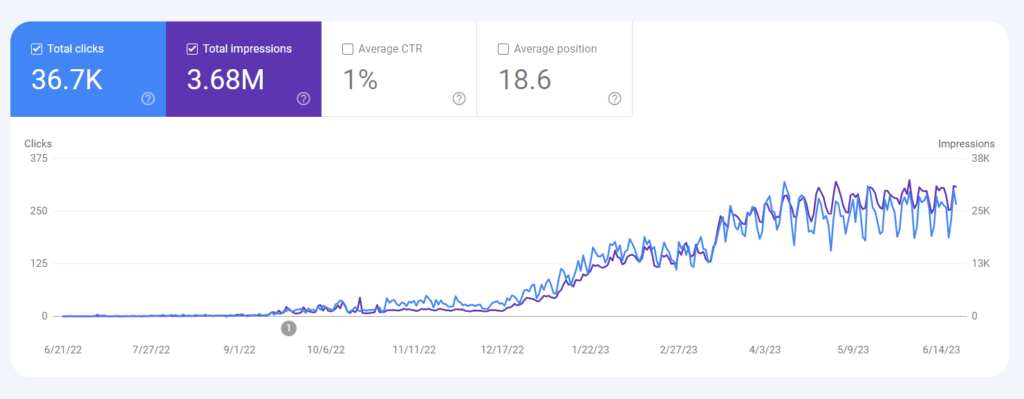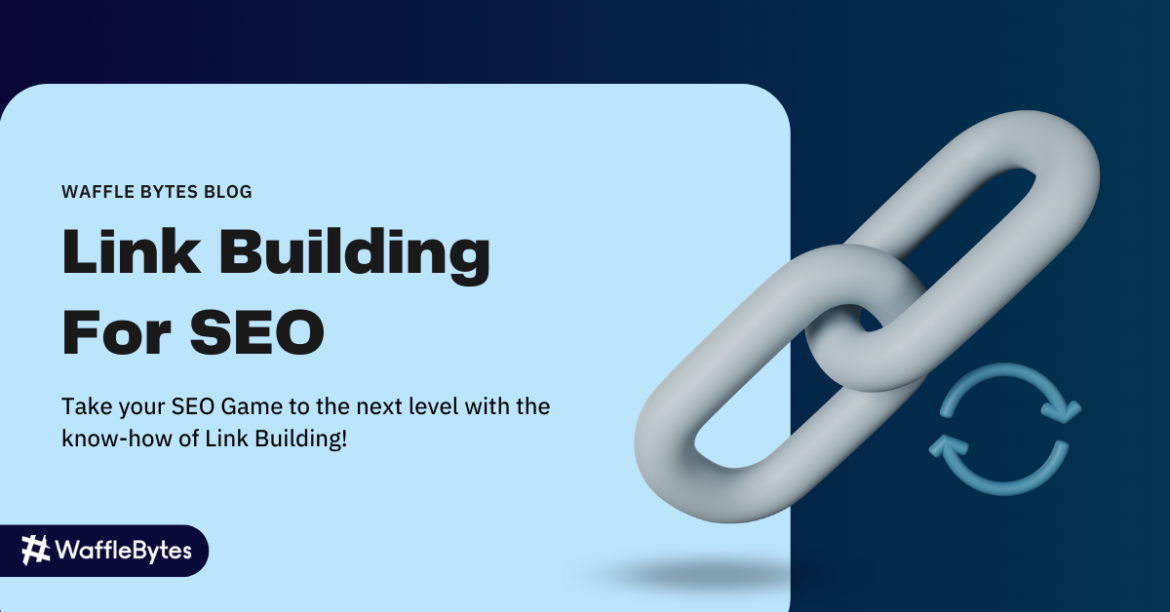Link Building is one of the most important exercises to increase the authority and traffic of your website. In the vast and competitive landscape of the internet, businesses and website owners are constantly seeking ways to improve their online presence. Among the myriad strategies available, link building stands out as a powerful technique for enhancing website authority and visibility.

The above graph is proof of the power of the backlinks. The rise in traffic is the result of efforts put into building backlinks. One year back, the impression and click on the website were below 1k. As we worked on the content and backlinks, the numbers have increased significantly from 1k to 3M+.
In this blog, we will delve into the world of link building, exploring its importance, benefits, and effective practices that helped us improve our numbers.
What is Link Building?
Link building is a process in search engine optimization (SEO) that involves acquiring hyperlinks from other websites to your own. These hyperlinks, also known as backlinks, are essentially a vote of confidence or endorsement from one website to another.
Search engines like Google consider backlinks as a crucial ranking factor in determining the authority and relevance of a website. When a website has a significant number of high-quality backlinks from reputable and relevant sources, search engines perceive it as trustworthy and valuable, resulting in higher rankings in search engine results pages (SERPs).
Importance of Link building
Link building is of paramount importance in the realm of search engine optimization (SEO). Here are several reasons why link building holds such significance:
#1 – Search Engine Rankings
Backlinks serve as a crucial ranking factor for search engines. Websites with a strong and diverse backlink profile are more likely to achieve higher rankings in search engine results pages (SERPs). When search engines see that reputable websites link to your content, they perceive your website as trustworthy and authoritative, leading to improved visibility and organic traffic.
#2 – Website Authority and Credibility
Backlinks act as votes of confidence from other websites. When reputable and relevant websites link to your content, it enhances your website’s authority and credibility. This association with trustworthy sources can significantly impact users’ perception of your brand, resulting in increased trust and a positive brand image.
You can check your domain/website authority from online tools available like ahrefs.
#3 – Organic Traffic Generation
Backlinks not only help search engines discover and index your website but also serve as pathways for users to find your content, particularly within your niche edits. When a user clicks on a backlink and lands on your website, it can generate valuable referral traffic and increase brand visibility and exposure. Quality backlinks from relevant sources can attract interested visitors who are more likely to engage with your content, convert into customers, or become loyal followers.
#4 – Indexing and Crawling
Backlinks play a crucial role in search engine crawling and indexing. Search engine bots follow backlinks to discover and navigate through different web pages. If your website has quality backlinks, search engines are more likely to crawl and index your content, leading to better visibility in search results.
What makes a link high-quality?
Links establishment on the web is not a big task, but in order to yield maximum benefits, you need to build high-quality links. Prioritizing quality over quantity is key to sustainable link-building success. But how do we know if links are of high quality? There are several key attributes that a high-quality link possesses, which makes it valuable and beneficial for your website. Here are the characteristics of a high-quality link:
Relevance
A high-quality link is relevant to your website’s content and industry. When the linking website and the linked page share a thematic connection, it indicates to search engines that the link is genuine and adds value to the user experience. Relevant links help establish the topical authority and context of your website.
Authority and Trustworthiness
Links from authoritative and trustworthy websites hold greater value. Search engines consider the reputation and credibility of the linking website when assessing the quality of a link. Websites with strong domain authority, a history of quality content, and a reputable online presence provide valuable endorsements and signals of trust.
Natural and Editorial Placement
High-quality links are obtained naturally and editorially placed within the content of a webpage rather than through manipulative tactics. Search engines have become increasingly adept at detecting and penalizing spammy or artificial link-building practices. Natural links are earned based on the merit and value of your content, resulting in a more sustainable and long-term approach to link building.
These links are embedded naturally within a relevant context, providing additional information or resources to readers. Editorial links are more likely to generate user engagement and carry greater weight in search engine algorithms.
Diverse Link Profile
A high-quality link profile consists of a diverse range of sources and types of links. Having links from various domains, different IP addresses, and a mix of link types (such as contextual, directory, or social media) demonstrates a natural link profile. Diversification reduces the risk of overreliance on a single source and increases the credibility of your backlink profile.
Traffic and Referral Potential
Links that can drive relevant referral traffic to your website add value beyond SEO. When a reputable website links to your content, it opens the possibility of attracting interested and relevant visitors. Such links provide direct exposure and potential business opportunities.
Anchor Text
The anchor text is the clickable text within a hyperlink. It should be descriptive and relevant. A high-quality link typically features anchor text that accurately describes the linked page’s content. Natural variations in anchor text usage, including branded, keyword-rich, and generic phrases, help create a more organic link profile.
Types of Link
Two primary types of links in SEO are nofollow and dofollow. These types determine how search engines treat the links and whether they pass on ranking authority. It’s important to note that while dofollow links are generally considered more valuable for SEO, a healthy backlink profile should include a mix of both nofollow and dofollow links.
| Do-Follow Links | No-Follow Backlinks | |
| Definition | Pass on link juice | Do not pass on link juice |
| Crawling | Indexed by search engines | Not indexed by search engines |
| Link Juice | Contributes to rankings | Does not contribute to rankings |
| Traffic | Drives referral traffic | Can generate referral traffic |
| Relevance | Often embedded in relevant content | Can be embedded in relevant content |
| Examples | Blog comments, guest posts, forum signatures | Social media links, sponsored links, user-generated content links |
1. Nofollow Links
Nofollow links are HTML attributes added to a hyperlink, signaling to search engine crawlers not to follow or pass on any ranking authority to the linked website. These links were introduced as a way to combat spam and prevent the abuse of link schemes. When a website includes the rel= “nofollow” attribute in a link, it informs search engines that the link should not be considered as a vote or endorsement for the linked website.
2. Dofollow Links
Dofollow links are standard links that do not include the rel= “nofollow” attribute. By default, all regular HTML links are considered dofollow unless otherwise specified. Dofollow links are recognized by search engine crawlers and pass on ranking authority from the linking page to the linked page.
3. Sponsored Links and user-generated content
In recent years, some search engines, including Google, have introduced additional link attributes such as rel= “sponsored” for paid links and rel= “UGC” for user-generated content. These attributes provide more specific signals to search engines about the nature of the links, helping them better understand and evaluate the link’s quality and intent.
Effective Link-Building Strategies
Now that you know how important and beneficial link building is for your website. The next step is to know the process and strategy to do Link Building that boosts your online presence and establishes your website as a trusted resource in your industry. Here are some effective strategies you can implement:
Strategy – 1. High-Quality Content Creation
Craft valuable, informative, and engaging content that naturally attracts backlinks from other websites. When your content provides unique insights or solves a problem, it becomes link-worthy material.
Strategy – 2. Guest Blogging
Reach out to reputable websites in your industry and offer to write guest posts. By contributing valuable content to these websites, you can earn backlinks in return, expanding your reach and building connections with other industry professionals.
Strategy – 3. Outreach and Relationship Building
Actively engage with influencers, bloggers, and website owners in your niche. Build relationships, share their content, and collaborate on projects. This networking can lead to natural link opportunities and potential partnerships.
Strategy – 4. Content Promotion
Amplify the reach of your content by leveraging social media, email marketing, and online communities. When your content gains visibility, there is a higher likelihood of attracting backlinks from interested parties.
Strategy – 5. Directory Submissions and Local Citations
Submit your website to relevant directories and ensure accurate and consistent information across local directories. This can help improve your website’s visibility in local search results and attract backlinks from authoritative directories.
Strategy – 6. Broken Link Building
Identify broken links on reputable websites within your industry and reach out to the website owners. Offer them a replacement link to your relevant and valuable content, providing a win-win solution and earning backlinks.
Strategy – 7. Influencer and Expert Interviews
Conducting interviews with industry influencers and experts can be a powerful link-building strategy. When you feature interviews on your website, the interviewees are likely to share the content, including the backlink to their interview, with their followers and networks. This can generate organic backlinks and increase visibility for your website.
Conclusion
Link building is an indispensable aspect of SEO that can significantly impact your website’s authority, visibility, and organic traffic. By employing effective link-building strategies such as creating high-quality content, engaging in guest blogging, outreach efforts, and content promotion, you can build a strong backlink profile that boosts your online presence and establishes your website as a trusted resource in your industry. Embrace the power of link building, and watch your website climb the ranks, attracting more visitors and achieving your online goals.

